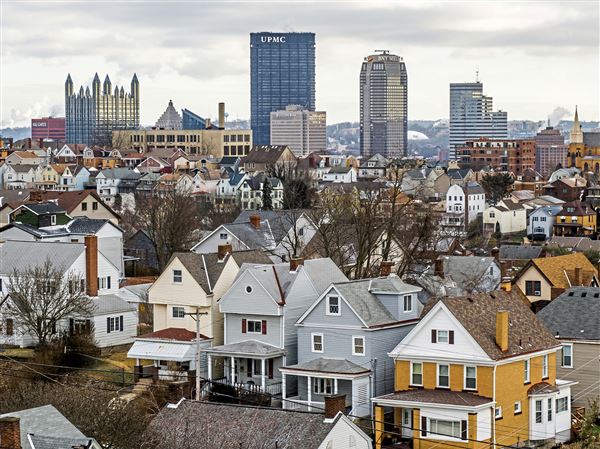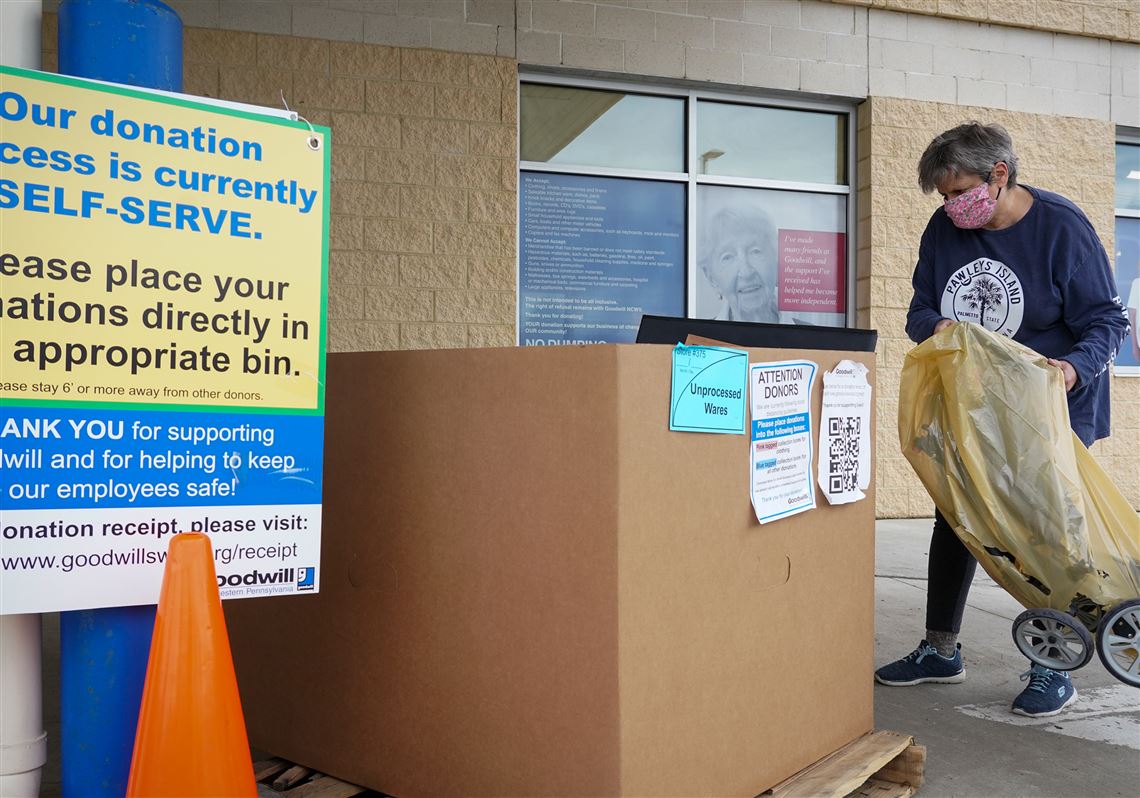Carloads of clothing that Pittsburghers want to donate to good causes are being drenched by rain, pilfered by late-night scavengers and basically failing to reach those who could put the items to good use.
In Western Pennsylvania, many organizations have had to close donation centers or get by with skeleton crews since Gov. Tom Wolf ordered businesses deemed nonessential to temporarily close in mid-March. But that hasn’t stopped people from dropping off items, resulting in piles of discarded clothes.
“We dealt with a lot of dumping,” said Andrew Marano, vice president of donated goods and retail for Goodwill of Southwestern Pennsylvania.
March and April showers made matters worse. “It kind of was a double whammy because it created a health and a safety issue. Donors donated really nice stuff, but it was getting ruined,” Mr. Marano said.
Goodwill of Southwestern Pennsylvania was recently granted permission from the governor’s office to open no-contact donation centers. There are multiple boxes set up at each site, including one specifically for clothing. Donors can drop off items daily between 9 a.m. and 5 p.m. Each site has signage with a QR code that can be scanned with a smartphone to obtain a donation receipt. An attendant outfitted in personal protective equipment removes donations throughout the day as boxes fill up.
If you’re donating clothing, you’ll need to take some extra safety precautions. According to the Centers for Disease Control and Prevention, COVID-19 generally survives for shorter periods at higher temperatures. Prior to donating clothing, you’re advised to wash it in water as warm as possible without damaging the fabric. Laundered clothes should then be stored and taken to donation centers in a dark plastic bag or a box to minimize contact.
At Goodwill, collected items are set aside for 72 hours before they’re handled as an additional safety precaution.
“That’s been working really well for us. We’ve been able to bring some people back to work,” Mr. Marano said.
Although dumping has improved, theft has become a problem after hours, he said.
“Typically, our stores would run, and we’d take donations from 9 a.m. to 9 p.m. There are people who are aware of our hours. We have cameras and we see people out there rifling through things.
“We’re monitoring that and working closely with local police departments to do whatever we can do.”
The Salvation Army’s Adult Rehabilitation Centers in Pittsburgh — which have temporarily halted clothing donations — also have experienced dumping and looting.
“Some of our locations are more susceptible to that than others,” said Martina O’Leary, administrator for business. “We also have people who see the donations sitting somewhere and then they go through them, and it creates quite a mess. That’s why we’re asking people to hold onto them.”
Clothing dumped outside the Free Store in Braddock will be discarded because there’s currently not a protocol in place to process and sanitize it, said founder Gisele Barreto Fetterman. It’s been closed since the governor’s business mandates went into effect but continues to serve the community.
Ms. Fetterman said she’s noticed a greater demand for food than clothing during the COVID-19 outbreak. She said she has made some porch deliveries of new clothing and has been referring anyone looking to donate gently worn items to Auberle in McKeesport.
“We are happy to talk about what people have to offer us and what our needs are,” said Aimee Plowman, director of Auberle housing programs and its 412 Youth Zone in Downtown Pittsburgh.
While demand for clothing hasn’t changed much during the pandemic, she said, Auberle still seeks it for its clients, who include those experiencing homelessness, people interviewing for jobs and families transitioning into permanent housing. To make a donation, call 412-673-5800.
Some nonprofits have used this downtime to plan how they’ll handle donations once business restrictions relax.
Dress for Success Pittsburgh plans to schedule no-contact drop-off appointments at its office in Bloomfield. It’s also exploring ways to use its two mobile units to service Butler and Fayette counties.
“We will definitely limit the amount of donations we can accept per week because we won’t have many volunteers in the facility when we go back for safety and social distancing reasons,” said area director Liz Mims.
Dress for Success has been responding remotely to women being hired in health care positions who need scrubs and nonslip shoes. In lieu of clothing donations, it’s seeking small monetary gifts to fulfill these requests.
“Twenty-five dollars buys a pair of shoes or a whole set of scrubs,” Ms. Mims said. “That can literally change a woman’s ability to work and make an income during this really unsure time.”
In the meantime, don’t get rid of clothing. Organizations are counting on it when they reopen, particularly those looking to stock resale stores.
“We think thrift sales are most likely to go up with the huge unemployment rates,” said Teddi Horvitz, president of the National Council of Jewish Women Pittsburgh section.
Sales from its resale store Thriftique in Lawrenceville are one of its main sources of revenue for the services it provides to women, children and families.
“Please don’t throw out your stuff. Create a holding space for it in the garage or trunk of the car until Thriftique does reopen,” she said.
Society of St. Vincent de Paul of Pittsburgh has been forced to close its five stores, which means “revenue has pretty much come to a stop,” said executive director Ricardo Luckow.
Sales at the stores help support people with rent, mortgages and utility payments, among other things. Mr. Luckow said St. Vincent de Paul is determined to ramp back up donation efforts and reopen its stores when the time is right.
“It becomes important that people realize we’re here and we help about 100,000 individuals and families a year, and we’re continuing to do so,” he said.
Sara Bauknecht: sbauknecht@post-gazette.com or on Twitter and Instagram @SaraB_PG.
First Published: May 2, 2020, 12:00 p.m.

















